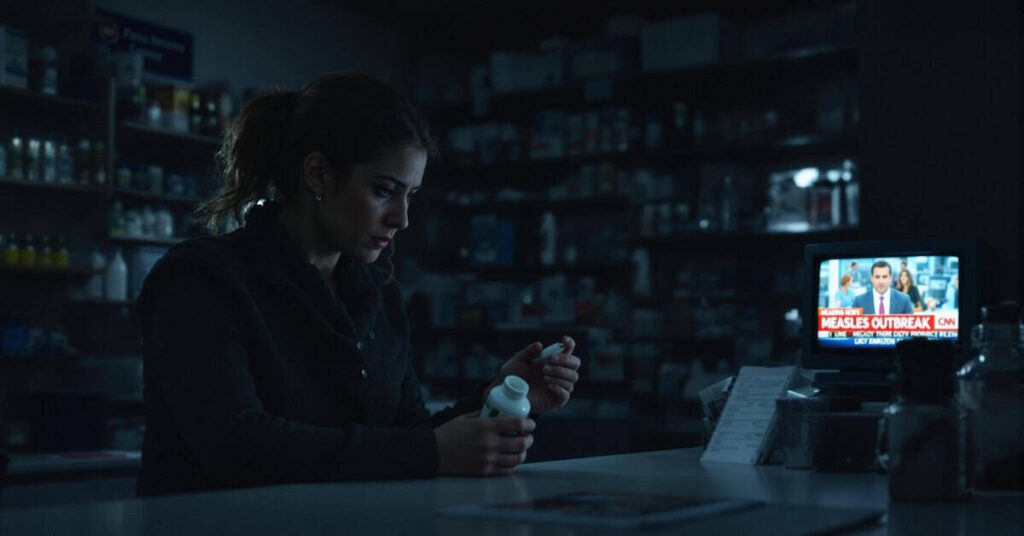Susan Patton doesn’t like taking medicine. She doesn’t trust it, doesn’t like the way it makes her feel. But this time, she was miserable—coughing, sneezing, watery eyes, congestion. She caved. She went to the pharmacy, bought some over-the-counter cold relief, and followed the instructions. The problem was that it took over an hour to work, and when it did, the relief didn’t last the promised six hours. Three hours in, she felt lousy again. Frustrated, she asked, “Instead of taking two doses every six hours, why can’t I take one dose every three hours? I need to be continuously taking this stuff because it doesn’t kick in, and then it kicks out way too soon.”
People assume dosage instructions are tailored to effectiveness. They’re not. “There are generalities like the sell-by date at the supermarket. It’s cautious. It’s about liability.” Medicine instructions weren’t crafted for individuals; they were built for safety margins, legal protection, and the lowest common denominator. Patton frowned, unimpressed. “So I’m just supposed to suffer in the name of liability?” Bock shrugged. “You’re in charge of your own health,” he said. The conversation shifted. If drug dosages were dictated by caution rather than optimization, what else in medicine would follow the same pattern?
That led them to the latest health scare: measles. A child had reportedly died in Texas. For decades, measles had been treated as a relic of the past, a childhood illness that once passed through neighborhoods without major concern. “Wow, I surely thought that the days of children dying from measles were long over,” Patton said. “It’s jarring just to hear that a child has died of measles.” The news felt unsettling, but Bock was skeptical. “What gets reported, what doesn’t. You can scare people with one measles death.”
Fear can be a very powerful motivator for agendas. Two years ago, it was monkeypox, and that disappeared. 2016 Zika Microcephaly nobody speaks of now. Vaccine skepticism is at a high, and fear can bring people back into the fold. Measles deaths don’t happen at high frequency in place with otherwise healthy kids.
The narrative around measles had changed drastically. Patton and Bock had both had it as children. It was a common childhood illness, and parents even organized “measles parties” to ensure their kids caught it early, when it was safer. “The thing that’s such a horrible, horrible illness that we had parties for it,” Bock said. “We had chicken pox parties. We had measles parties.” Now, measles was a crisis. An outbreak. A cause for national alarm. Why? Who decided when an illness was a mild inconvenience and when it was a catastrophe?
Their conversation turned to Andrew Wakefield, the British doctor who lost his career after questioning the MMR vaccine’s safety. He didn’t call for eliminating vaccines, but he suggested breaking them up—measles, mumps, and rubella—to better track potential side effects. Wakefield apparently didn’t disclose monetary conflicts of interest and was banned from medicine. The supposition, though, may live on. It has never really been fully studied, and it is not a horrible idea to go back and separate these combination vaccines to check for individual or combined side effects.
From vaccines, they shifted back to the broader topic of drug safety—specifically, expiration dates. Patton laughed. “I’ve got a bottle of Campho-phenique that expired in March of 1986. Maybe I should get rid of it.” They moved on to the flu, cold medicine, and how people handled sickness before modern symptom relievers. Bock explained that many of the body’s reactions—sneezing, coughing, fever—weren’t just symptoms of illness; they were part of the healing process. “Your body wants to get rid of things,” he said. “Sneezing, coughing, even a fever—it’s all part of the process. You suppress those things, sometimes you’re prolonging the illness.” Patton crossed her arms. “So, medicine just makes us feel better but keeps us sick longer?” Bock considered. “Sometimes.” She sighed. “So I have a choice between feeling miserable for a shorter time or functioning at half-speed for a longer time?” He nodded. “That’s about right.”
Patton sat for a moment, looking at the bottle of cold medicine on the table. There was a time when kids got sick, got through it, and moved on. There weren’t long debates, expiration dates, or liability-driven dosage rules. She smirked. “Life was simpler when we just had measles parties.”
Join us on weekdays at 5 pm ET weekdays on America Out Loud Talk Radio. Listen on iHeart Radio, our world-class media player, or our free apps on Apple, Android, or Alexa. Discover all the episodes on podcast networks, i.e., Apple Podcasts, Spotify, Pandora, TuneIn, Stitcher, and iHeart. You’ll find them the day after they air on talk radio, available on podcast. Extraordinary voices for extraordinary times.
